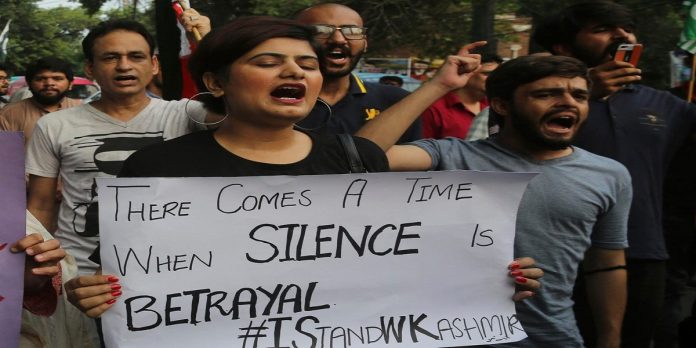SRINAGAR: A 27-year-old man from South Kashmir was among the patients waiting anxiously in the lounge of a private mental health clinic in Anantnag (Islamabad) town.
“I have a phobia that I will have a heart attack,” said the 27-year-old, who has a postgraduate degree in botany and wrote the Union Public Services Commission entrance exam earlier this year.
Trouble had started about four years earlier, when he was living near a coaching centre in Greater Noida, on the outskirts of Indian Capital New Delhi, preparing for a different entrance examination. Scrolling down his Facebook feed, he had stumbled on bad news from home – a young boy from a village near his had died of a sudden cardiac arrest.
The very same day, he had stomach trouble. Over the next two weeks, filled with “restlessness and fear”, he stopped attending classes. He went home, hoping to get better but got worse.
Three top cardiologists assured him he was fine. “But I wasn’t ok,” said the 27-year-old. “I couldn’t get this post off my mind. I lost a year trying to find a way out.”
He managed to write his UPSC exams this year but got only average marks. “I know I could have done better,” he said. But he had not been able to focus on preparing for the exams.
Eventually, it was a nudge from a general physician at a Srinagar hospital that made him realise he may need psychiatric help. “I Googled my symptoms and read about others facing similar problems,” he said.
A few more Google searches for private mental health facilities near him led him to the Anantnag clinic, about 20 kilometres away from his home in Kulgam district. The clinic in Anantnag town, packed with patients, was closer home than Srinagar.
“Had it been in Srinagar, I would have had to spend the whole day on travel,” he explained.
Sizing up the problem For years, the Government Hospital for Psychiatric Diseases in Srinagar was the only address for those seeking help with mental health problems. However, a growing awareness about mental health has meant more patients are seeking help at the local level, in their home districts. Driving this phenomenon is the spread of public as well as private mental health care infrastructure across the Kashmir Valley.
Over the last decade, government hospitals in all 10 districts of Kashmir have set up mental health clinics. Districts like Baramulla, Kupwara, Kulgam and Budgam have clinics at the sub-district level as well. Kashmir also has mental health clinics in three jails, at Baramulla, Srinagar and Anantnag. Taken together, there are about 17 government-run mental health clinics across districts. The government medical colleges in Anantnag in South Kashmir and Baramulla in the North also have psychiatry departments.
According to psychiatrist Arshad Hussiain, Kashmir is an outlier when compared to states across India. “It would be a rarity in the whole of India that all district hospitals have psychiatrists available at OPDs [out patient departments],” he said.
While data for the number of private mental health clinics is not immediately available, psychiatrists believe they are a growing trend in Kashmir. But even these facilities may not be enough for Kashmir, where mental health problems are usually studied through the lens of conflict. Decades of violence have left deep scars among most denizens of the Valley.
A 2004-05 study on the prevalence of trauma had revealed that around 59% of 1,200 individuals surveyed across four districts had undergone a traumatic experience. The trauma of having experienced shooting or explosions was the most common.
In 2009, a study published by Qassim University’s International Journal of Health Sciences had surveyed 2,728 individuals in the Kashmir Valley. It found the prevalence of depression was highest (66.67%) in the 15-25 years age group, followed by 65.33% in the 26-35 years age group.
A 2015 study, conducted by Médecins Sans Frontières in collaboration with Kashmir University’s Department of Psychology and the Institute of Mental Health and Neuroscience in Srinagar, surveyed all 10 districts of the Valley. It seemed to suggest a problem of a staggering scale.
“The survey showed that nearly 1.8 million adults (45% of the adult population) in the Kashmir Valley are experiencing symptoms of mental distress, with 41% exhibiting signs of probable depression, 26% probable anxiety and 19% probable Post Traumatic Stress Disorder (PTSD),” it said.
But the next year, a joint study by Action Aid, a non-governmental organisation, and the Institute of Mental Health and Neuroscience at Srinagar came up with lower figures – 11.3% of the adult population in Kashmir suffered from mental illnesses, it concluded. This was still considerably higher than the national average of 7.3%.
Getting help What the Action Aid study also emphasised was that only 6.4% of those experiencing mental health issues had tried to get professional help. “The reasons for this low treatment level may be because of very high stigmatisation of these illnesses in the society, very low awareness about illness as well as about treatment, and inaccessible treatment at the community level, as most mental health services available in Kashmir are located in urban areas,” the study noted.
For instance, a 59-year-old woman from Anantnag district’s Brakpora village, who identified herself only as Bano, spent years being treated for various physical symptoms before doctors realised the problem might lie elsewhere.
After three years of being treated for back problems, Bano suddenly developed stomach trouble and palpitations this January. “She couldn’t sleep and her shoulders stiffened,” explained her daughter. “We took her to a physician who asked her to do some tests. The tests didn’t show any problem with her stomach or heart.”
The physician then put her on an antidepressant for three months, which helped. “We have a gynaecologist in our family. When she saw my mother, she suggested we see a psychiatrist,” said her daughter.
Early September, when Bano visited a psychiatrist at a clinic in Anantnag town, she was diagnosed with major depressive disorder. Two weeks after her first visit, she was doing relatively well. The medication had worked and she was able to sleep.
A slow change However, mental health practitioners in Kashmir say that the trend is “definitively changing”.
Read more: Israel setting up two Agri Centres of Excellence in Kashmir and Jammu


